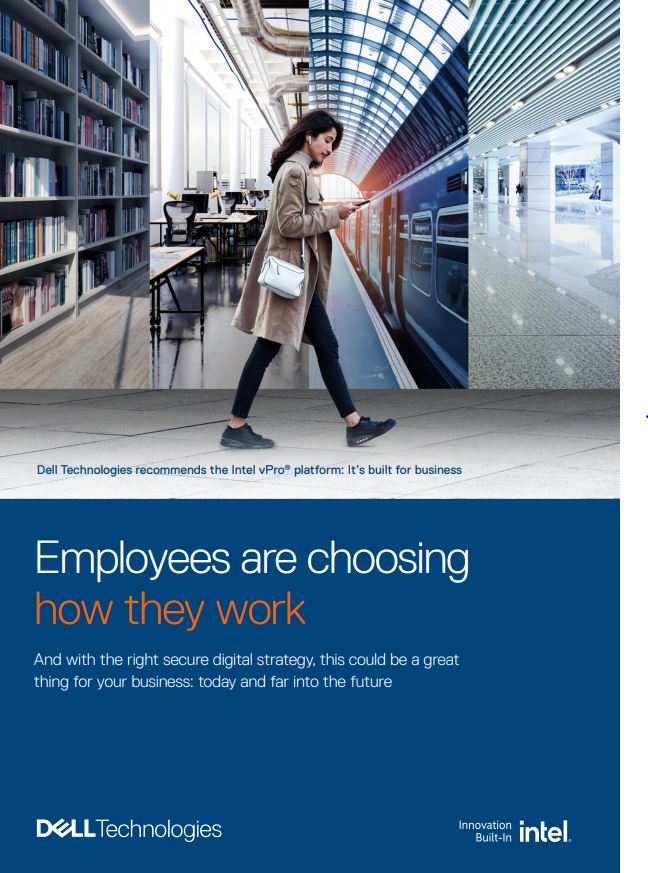UK's four-day week trial ends, leads to reduced burnout and sick days
Organisations reported overwhelmingly-positive results from the world's largest trial of this kind


The UK's six-month trial examining a four-day working week has yielded positive results, with 92% of firms choosing to retain the structure.
Among the most notable improvements across the companies involved in the trial were better staff health, overall happiness, and increased productivity.
RELATED RESOURCE

Employees are choosing how they work
And with the right secure digital strategy, this could be a great thing for your business: today and far into the future
The results showed a clear improvement in employee working conditions before and after the trial was implemented. Burnout fell by 71% and sick days by 65%, with almost half of the employees having reported a reduction in fatigue.
Companies also marked a reduction in churn, with a 57% drop in staff resignations across the trial compared to a comparison period of equal length.
The vast majority of employees indicated that they preferred the four-day schedule, and 15% stated that no amount of money could convince them to return to a five-day week.
60% of respondents also indicated that they were more able to combine their work and care responsibilities under a four-day week, while 62% said they could balance their work and social lives better. Revenue in participating companies remained largely unchanged, rising 1.4% on an average weighted by company size.
“This is a major breakthrough moment for the movement towards a four-day working week,” said Joe Ryle, director of the 4 Day Week Campaign
Get the ITPro daily newsletter
Sign up today and you will receive a free copy of our Future Focus 2025 report - the leading guidance on AI, cybersecurity and other IT challenges as per 700+ senior executives
“Across a wide variety of different sectors of the economy, these incredible results show that the four-day week with no loss of pay really works. Surely the time has now come to begin rolling it out across the country.”
The study was the world’s largest looking at four-day working weeks and gathered results from 61 companies and more than 2,900 workers around the UK. 56 of these firms have chosen to continue with the work structure, with 18 confirming this is a permanent change.
Different types of companies took part in the trial across a range of sectors including financial and tech services, online retail, telecommunications, and food and beverage.
The trial also included a range of company sizes and strategies, to demonstrate the effects of the 32-hour week on as wide a pool of employees as possible.
The UK's four-day week trial in full
The trial, which began in June 2022 and ran until December of the same year, was run by progressive research organisation Autonomy in collaboration with 4 Day Week Global, the 4 Day Week UK Campaign, Boston College, and the University of Cambridge.
The full methodology and in-depth trial results were published by Autonomy in a paper, which also includes anonymised testimonies from business leaders.
The trial ran on the agreement that companies would pay employees 100% of their pay, for 80% of their time, and for 100% of their productivity. The majority of companies sought to implement the change to their working week with no reduction in output, and interviewed workers indicated that the loss of one day per week was its own incentive to work harder on the remaining four.
Some companies made employees sign agreements to maintain their productivity as a condition of the change, and brought in new methods such as holding meetings less regularly, automating some processes, and using new IT management software.
Autonomy reported that only two of the companies interviewed had taken to further recruitment to maintain productivity alongside their four-day week.
At the halfway point of the trial in September, 95% of participating organisations said productivity had maintained or improved. In 2019 Microsoft ran a four-day week trial in its Japan offices, and saw a subsequent 40% rise in productivity.
The trial accounted for a range of different four-day week structures, so long as pay remained at 100%. This allowed the four-day week to be adopted by companies across a range of industries and company cultures.
These included ‘fifth-day stoppage’ in which companies would cease operations for one day per week, a staggered approach in which two or more groups of staff took alternating days off, and a decentralised model in which the week structure varied by department.
Some companies that operate seasonally also worked the four-day week as an annualised average of 32 hours per week, in which staff worked longer opening hours during the ‘on’ season and shorter hours in the ‘off’ season with no loss of pay.
RELATED RESOURCE

A small number of technology companies are already accredited with the 4 Day Week campaign, and more could follow in the wake of the successful results. Flexible work has long been a touted benefit of working in the tech industry.
Unlike other benefits, the four-day week could weather economic hardship, as employers actually stand to save money if the scheme is properly implemented.
It has been suggested that workers coming into an office for one fewer day per week could slash businesses’ energy bills, and if implemented on a widespread basis could reduce carbon emissions produced by commuters.
“The method of this pilot allowed our researchers to go beyond surveys and look in detail at how the companies were making things work on the ground,” said Dr David Frayne, research associate at the University of Cambridge.
“We feel really encouraged by the results, which showed the many ways companies were turning the four-day week from a dream into a realistic policy, with multiple benefits. We think there is a lot here that ought to motivate other companies and industries to give it a try”.

Rory Bathgate is Features and Multimedia Editor at ITPro, overseeing all in-depth content and case studies. He can also be found co-hosting the ITPro Podcast with Jane McCallion, swapping a keyboard for a microphone to discuss the latest learnings with thought leaders from across the tech sector.
In his free time, Rory enjoys photography, video editing, and good science fiction. After graduating from the University of Kent with a BA in English and American Literature, Rory undertook an MA in Eighteenth-Century Studies at King’s College London. He joined ITPro in 2022 as a graduate, following four years in student journalism. You can contact Rory at rory.bathgate@futurenet.com or on LinkedIn.
-
 Bigger salaries, more burnout: Is the CISO role in crisis?
Bigger salaries, more burnout: Is the CISO role in crisis?In-depth CISOs are more stressed than ever before – but why is this and what can be done?
By Kate O'Flaherty Published
-
 Cheap cyber crime kits can be bought on the dark web for less than $25
Cheap cyber crime kits can be bought on the dark web for less than $25News Research from NordVPN shows phishing kits are now widely available on the dark web and via messaging apps like Telegram, and are often selling for less than $25.
By Emma Woollacott Published
-
 IT professionals aren’t budging on flexible work demands – and more than half say they’ll quit if employers don’t meet expectations
IT professionals aren’t budging on flexible work demands – and more than half say they’ll quit if employers don’t meet expectationsNews Analysis from Randstad shows 40% of UK-based IT pros have quit over a lack of flexible work options, while 31% of workers globally have done the same.
By Ross Kelly Published
-
 'The tide seems to be turning towards office attendance': 64% of hybrid business leaders want staff back in the office – but many worry that enforcing RTO mandates will drive employees away
'The tide seems to be turning towards office attendance': 64% of hybrid business leaders want staff back in the office – but many worry that enforcing RTO mandates will drive employees awayAnalysis Many UK business leaders want their staff back in the office more frequently, but they’re scared to implement return to office (RTO) mandates in fear of worker revolts.
By George Fitzmaurice Published
-
 Employees are dead set on flexible working arrangements – three quarters would turn down a role that didn't offer hybrid options as work-life balance becomes more important than pay
Employees are dead set on flexible working arrangements – three quarters would turn down a role that didn't offer hybrid options as work-life balance becomes more important than payNews New research shows workers are increasingly demanding flexible working arrangements from employers.
By Emma Woollacott Published
-
 Nearly half of tech workers are seeking new roles – declining employee benefits and reduced flexible working options have staff looking elsewhere
Nearly half of tech workers are seeking new roles – declining employee benefits and reduced flexible working options have staff looking elsewhereNews While salaries are rising for tech workers, other benefits are in decline, leading to a fall in job satisfaction
By Emma Woollacott Published
-
 The race is on for higher ed to adapt: Equity in hyflex learning
The race is on for higher ed to adapt: Equity in hyflex learningWHITEPAPER Fulfil student and faculty needs
By ITPro Published
-
 Practical ergonomics guide for education
Practical ergonomics guide for educationWHITEPAPER Save energy, focus, and promote overall well-being
By ITPro Published
-
 Untethered: How CIOs and CISOs are paving the way for the new hybrid workforce
Untethered: How CIOs and CISOs are paving the way for the new hybrid workforceWhitepaper Effective techniques to transition from exposed legacy infrastructure to an effective zero trust strategy
By ITPro Published
-
 Unified endpoint management and security in a work-from-anywhere world
Unified endpoint management and security in a work-from-anywhere worldWhitepaper Learn how to converge endpoint management and security processes and systems to drive efficiency and reduce risk
By ITPro Last updated